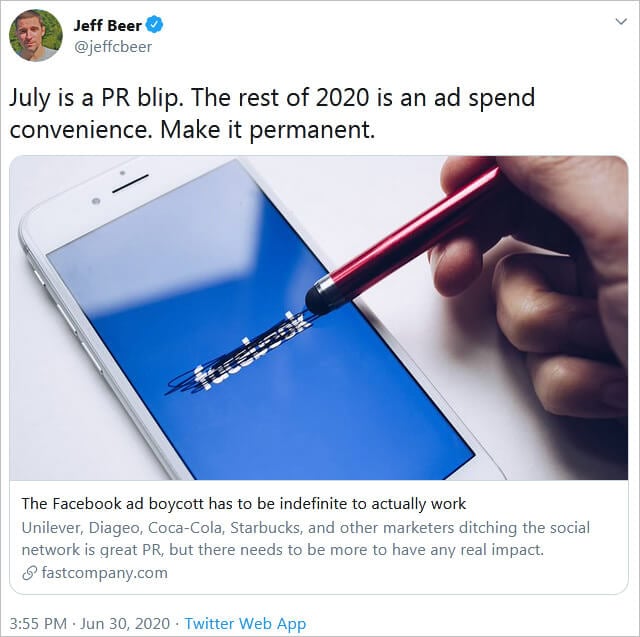Why Facebook’s Advertiser Boycott Is Destined to Be a Dud

Mark Zuckerberg isn't going to overhaul his social media platform. He's going to drag his feet and adopt token reforms until things calm down - and his advertisers come crawling back. | Source: Brendan Smialowski / AFP
- The list of advertisers joining the #StopTheHateForProfit boycott keeps growing.
- Don’t count on the campaign being more successful than the #DeleteFacebook movement, though.
- Facebook will only cave if it believes its advertising revenue faces a long-term threat.
The #StopTheHateForProfit campaign targeted at Facebook (NASDAQ: FB) has led dozens of advertisers to pull their ad dollars from the social media giant.
Still, given Facebook’s history, it’s hard not to be cynical. Who has forgotten the #DeleteFacebook movement? That boycott looked promising – initially. Yet it failed to dent the platform’s user numbers, which placed little pressure on the Mark Zuckerberg-led firm to alter course.
There is a temptation to argue that it’s different this time because the boycott targets Facebook’s revenue stream directly. But the odds are high that the #StopTheHateForProfit campaign is going to end up being just as big a disaster.
Here are three reasons why.
1. Facebook’s true cash cows haven’t joined the boycott
The bulk of Facebook’s advertising revenue comes from small and medium-sized businesses. The big names may have the influence – and generate headline coverage – but they don’t hold as much sway as you would expect.
The top 100 advertisers only bring in 6% of Facebook’s total ad revenue . That’s still a significant amount of revenue. Yet it’s clear that while individual small businesses might not have the clout of Coca-Cola or Starbucks, these 8 million customers are the platform’s true bread and butter.
But that’s not the only problem. The boycott has attracted some big names, but many of Facebook’s largest advertisers have remained on the sidelines. This includes Procter & Gamble, Disney, and Walmart.
Don’t expect Facebook to adopt any real changes until its advertisers speak with one voice. For all the headlines, that still hasn’t happened.
2. Facebook’s conservative faction is powerful and influential
Even though Silicon Valley tilts heavily to the left, Facebook’s conservative minority is powerful and influential.
The conservative-leaning individuals in Facebook’s top hierarchy include billionaire Peter Thiel and Joel Kaplan. The former is a non-executive director, while the latter is Facebook’s vice president of global public policy.
Earlier this week, reports revealed that Mark Zuckerberg had been willing to take tougher stances against hateful content as far back as 2015 – including a controversial video by then-presidential candidate Donald Trump – until Kaplan dissuaded him.

According to other reports, Thiel – a prominent Republican donor – pushed Zuckerberg and Facebook not to fact-check political ads.
There’s no question Zuckerberg has high regard for the opinions of Kaplan and Thiel. And as long as they remain in Zuckerberg’s inner circle, the Facebook CEO is more likely to respond to politically-tinged controversies by making fundamentally cosmetic changes and waiting for the heat to subside.
3. Starting a boycott is easy. Maintaining one isn’t.

Joining a Facebook ad boycott is an easy decision. It’s the popular thing to do. It generates positive media coverage. And no one wants to be the odd one out when corporate America is taking an anti-racism stance.
Besides, the state of the economy is forcing big companies to trim advertising budgets anyway. So why not leverage those cuts into some free advertising?
But if joining a boycott is an easy decision, sticking to that boycott isn’t.
Many advertisers have only committed to halting Facebook ads for 30 days. Do they have the will, and can they brave the consequences, if it is necessary to extend the boycott beyond July?

As it is, some of the boycott’s loudest voices may have to resume advertising on Facebook to jumpstart their revenues, especially if their competitors aren’t taking part. How many are willing to put their market share at risk indefinitely?
Facebook is all too aware that the boycott movement faces an uphill battle. And that’s why Mark Zuckerberg isn’t going to overhaul his social media platform. He’s going to drag his feet and adopt token reforms until things calm down – and his advertisers come crawling back.
We’ve watched this Facebook Story before.
Disclaimer: This article represents the author’s opinion and should not be considered investment or trading advice from CCN.com. Unless otherwise noted, the author has no position in any of the stocks mentioned.